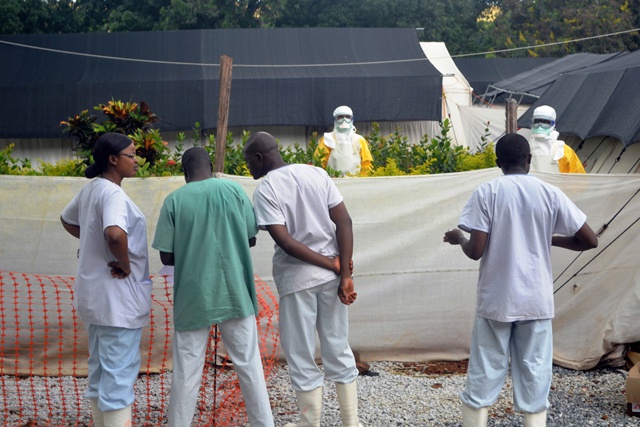The Ebola epidemic in West Africa could reverse years of economic gains in the region. Thousands of lives been lost since January 2014, closed borders and abandoned farms are driving up food costs, and emergency spending on health services is siphoning off money from already cash-strapped government budgets.
The World Health Organization said it needs foreign medical teams with 500-600 experts, as well as at least 10,000 local health workers, to fight the disease. To date, Cuba’s 165 medical professionals bound for Sierra Leone early October is the largest foreign medical team from a single country.
The Cuban team comprises 100 nurses, 50 doctors, four epidemiologists, three intensive care specialists, three infection control specialist nurses and five social mobilization officers – all with more than 15 years’ experience, including in countries facing natural disasters and disease outbreaks. The team will undergo WHO-standard infection control training in Cuba before leaving for West Africa, where they will spend six months in Ebola treatment centers and community clinics.
The United States, meanwhile, is deploying 3,000 U.S. military personnel, adding to its earlier efforts to help contain the disease. Under a U.S. Africa Command Joint Force Command set up in Monrovia, Liberia, the U.S. troops will establish 17 health care facilities of 100 beds each to isolate and treat victims, and a facility to train 500 health care workers per week.
A World Bank report, The Economic Impact of the 2014 Ebola Epidemic: Short and Medium Term Estimates for Guinea, Liberia and Sierra Leone, outlines the toll the crisis could take on the three most heavily affected countries if the disease continues to spread. Estimates of the impact on the three countries for 2015 range from $97 million (if the epidemic is rapidly contained) to $809 million (if control of the epidemic is delayed).
“Taken together, the humanitarian response, the fiscal support, the investment in secure transportation links and the expanded disease surveillance and treatment capacity will not only stem the Ebola epidemic, but help to reverse as quickly as possible the aversion behavior that is causing so much economic damage,” the report says.
Guinea. Early estimates for growth in Guinea have been halved from 4.5 percent to 2.4 percent as a result of the disease. The country has seen the biggest losses in its agriculture industry. An exodus of farm workers from the countryside has meant lower exports of key products like cocoa and palm oil.
Sierra Leone. Sierra Leone, once navigating toward Middle Income status at an 11.3 percent annual growth rate, could see growth of only 8 percent in 2014 and zero in 2015. The country has been devastated by restrictions on international travel, the closing of markets, disruption of farming activities and a slow-down in critical mining operations as a result of foreign workers fleeing the country for fear of contracting Ebola.
Liberia. Liberia is currently the country worst affected by the Ebola crisis. The World Bank attributes the largest economic effects of the crisis to fear-driven changes in behavior, which have resulted in generally lower demand for goods and services and consequently lower domestic income and employment.
It says Liberia could see negative growth rates in 2015 — if Ebola is not quickly contained — impacted by the closure of one the country’s two major mining companies as a result of the disease outbreak and by disruptions to farming and agriculture. The services sector has also been affected. Liberia has seen incoming commercial flights slump from 27 per week to just six. Some hotels have reported occupancy rates as low as 10 percent leading many hotel workers to lose their jobs.
Neighboring countries. So far, Nigeria, Cote d’Ivoire, Guinea-Bissau, Senegal and The Gambia have had limited economic impact as a result of the epidemic. That could change if measures are not taken to quickly contain the disease.
Limiting the human costs and economic impacts of Ebola will require significant financial resources, coordination between international partners and the affected countries, and commitment, the World Bank report concludes. It recommends the following measures:
- Supporting the humanitarian efforts to finance medical equipment, emergency treatment units and personnel salaries;
- Helping countries bridge the $290 million fiscal gap for 2014 and continue as the gap grows in 2015;
- Providing infrastructure and financing to countries’ international transportation links; and
- Strengthening the surveillance, detection and treatment capacity of African health systems.













